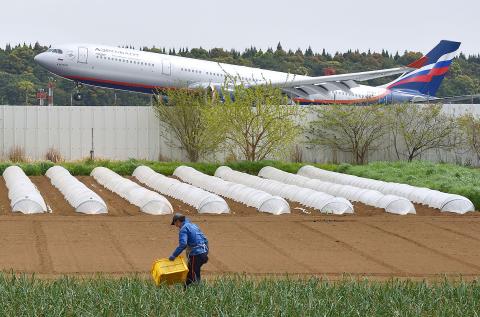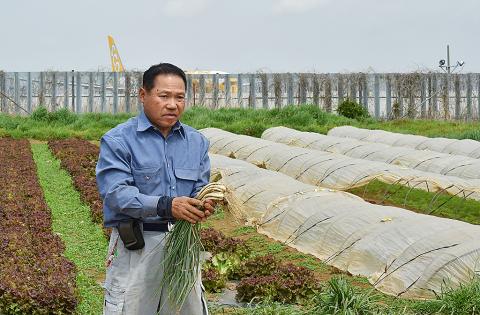You cannot choose your neighbors, as Japanese organic farmer Takao Shito knows all too well after a decades-long battle against Narita International Airport — the nation’s second-busiest airport.
His farm is virtually surrounded by Narita, and jets from around the world roar down right next door to his rows of peas and radishes that wave in the spring breeze.
“You get used to the noise,” the soft-spoken 68-year-old said on his farm, most of which is only accessible via tunnels underneath the airport.

Photo: AFP
“These are pieces of land farmed by three generations for nearly a century, by my grandfather, my father and myself. I want to continue living here and farm,” he said.
His fight, along with a handful of other families, has proved a major headache for Narita, which marks its 40th anniversary this year.
The airport is Tokyo’s main international gateway and handles 40 million passengers and 250,000 flights a year.

Photo: AFP
Narita has been controversial in the region since it was first proposed by the government in 1966 as a three-runway facility, sparking protests by activists and farmers, including Shito’s father.
The demonstrations turned violent, ending with the deaths of several police officers and protesters.
The airport opened in 1978, with authorities only apologizing years later for their heavy-handed response to protests.
However, continued local opposition meant it operated with just a single runway until 2002, when a second opened.
The airport purchased lots adjacent to the planned second runway’s route from the legal landowners, including some who had rented to Shito’s family for decades.
However, Shito refused to move, arguing his livelihood depends on the land and pointing to Japan’s Agricultural Land Act, which gives farmers broad legal protection.
So the airport altered the route leading to the runway, which now curves around Shito’s farm, encircling one of his lots.
With increasing tourist numbers and Tokyo hosting next year’s Rugby World Cup and then the Summer Olympics in 2020, the airport wants to build a third runway.
It would not run near Shito’s farm, but the airport faces negotiations with other nearby farmers.
Seen from above, the plots that Shito and his neighbors farm are fenced-in brown soil islands, trapped inside a web of taxiways used by planes.
With planes thundering in and out of the airport throughout the day and into the night, it is hardly an idyllic farming existence, but Shito is undeterred. He is involved in five separate lawsuits with the airport and has steadfastly refused compensation in return for relocating.
“This is not at all about money,” he said.
“I do organic farming with no pesticides. You cannot just move the top soil and hope it will be the same in different lots.”
While the area around the airport might not seem the ideal location for organic farming, air and water quality monitors in and around Narita show no sustained and elevated levels of contaminants.
The airport has already won a major case against Shito and convinced some other farmers to take compensation to move, but it is tight-lipped about whether it might evict him.
“We will determine our future actions by consulting with attorneys and others concerned, while also reviewing the situation,” the airport said in a response to written questions.
Shito’s tense relations with the airport lead to occasional run-ins with security.
On a recent morning, a black SUV cruised by and followed a group of visitors to one of his lots outside the airport, monitoring from afar.
“Police or airport security,” Shito said. “There are times I get stopped. They ask for my ID, even though they know who I am.”
Yet he says he is happy on the land, and has about 400 clients in and around Tokyo who buy his organic produce.
“I have fun growing vegetables here. This is my life: growing vegetables on this soil. They taste different,” he said.
He also has plenty of supporters. At a recent hearing at Chiba District Court, about 60 activists filled a courtroom and loudly heckled the judge in a noisy show of solidarity.
Some even want the entire airport to be dismantled and the region returned to its pastoral past.
Nobuharu Ito, 71, who began protesting more than four decades ago as a university student, said he has been moved by Shito’s commitment to his land.
“Mr Shito’s way of living, how it’s not about money, I think it resonates with people now more than ever,” he said.
Despite his decades-long feud with the airport, Shito said he would happily continue coexisting with Narita given the opportunity.
“When the government does and says something, I think most people accept it or give up without questioning,” he said. “I feel the government should also be considerate of individuals who live here.”
For now, he has no plans to stop fighting, Shito said, adding: “I want the people of the world to know there is a farmer here in this place. I want people to know.”

The death of a former head of China’s one-child policy has been met not by tributes, but by castigation of the abandoned policy on social media this week. State media praised Peng Peiyun (彭珮雲), former head of China’s National Family Planning Commission from 1988 to 1998, as “an outstanding leader” in her work related to women and children. The reaction on Chinese social media to Peng’s death in Beijing on Sunday, just shy of her 96th birthday, was less positive. “Those children who were lost, naked, are waiting for you over there” in the afterlife, one person posted on China’s Sina Weibo platform. China’s

‘NO COUNTRY BUMPKIN’: The judge rejected arguments that former prime minister Najib Razak was an unwitting victim, saying Najib took steps to protect his position Imprisoned former Malaysian prime minister Najib Razak was yesterday convicted, following a corruption trial tied to multibillion-dollar looting of the 1Malaysia Development Berhad (1MDB) state investment fund. The nation’s high court found Najib, 72, guilty on four counts of abuse of power and 21 charges of money laundering related to more than US$700 million channeled into his personal bank accounts from the 1MDB fund. Najib denied any wrongdoing, and maintained the funds were a political donation from Saudi Arabia and that he had been misled by rogue financiers led by businessman Low Taek Jho. Low, thought to be the scandal’s mastermind, remains

‘POLITICAL LOYALTY’: The move breaks with decades of precedent among US administrations, which have tended to leave career ambassadors in their posts US President Donald Trump’s administration has ordered dozens of US ambassadors to step down, people familiar with the matter said, a precedent-breaking recall that would leave embassies abroad without US Senate-confirmed leadership. The envoys, career diplomats who were almost all named to their jobs under former US president Joe Biden, were told over the phone in the past few days they needed to depart in the next few weeks, the people said. They would not be fired, but finding new roles would be a challenge given that many are far along in their careers and opportunities for senior diplomats can

Australian Prime Minister Anthony Albanese yesterday announced plans for a national bravery award to recognize civilians and first responders who confronted “the worst of evil” during an anti-Semitic terror attack that left 15 dead and has cast a heavy shadow over the nation’s holiday season. Albanese said he plans to establish a special honors system for those who placed themselves in harm’s way to help during the attack on a beachside Hanukkah celebration, like Ahmed al-Ahmed, a Syrian-Australian Muslim who disarmed one of the assailants before being wounded himself. Sajid Akram, who was killed by police during the Dec. 14 attack, and